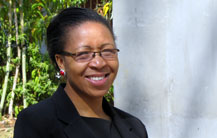Latest News Archive
Please select Category, Year, and then Month to display items
14 June 2024
|
Story Anthony Mthembu
|
Photo Suplied
 Jeremiah Hlahla, a UFS student completing his PhD in Botany at the University of Debrecen as part of an exchange initiative funded by the Erasmus+ Mobility Programme.
Jeremiah Hlahla, a UFS student completing his PhD in Botany at the University of Debrecen as part of an exchange initiative funded by the Erasmus+ Mobility Programme.
As part of an exchange initiative facilitated by the Erasmus+ Mobility Programme, Jeremiah Hlahla, a student at the University of the Free State (UFS), is nearing the completion of his PhD studies at the University of Debrecen in Hungary. Hlahla’s journey, which began in February 2024 and is set to conclude in July 2024, has been a remarkable learning opportunity. “As a first time-traveller to Europe, I have thoroughly enjoyed engaging with people from different countries and cultures,” he said.
The benefits of international collaboration
Hlahla is currently pursuing a PhD in Botany, focusing on plant stress physiology. “My current PhD project investigates the physiological, biochemical and morphological responses of vegetable-type soybean, or edamame, to combined drought and heat stress,’’ he explained. He considers the University of Debrecen the ideal institution to complete his research due to its extensive expertise and resources in similar projects. He noted that his colleagues at Debrecen conduct significant work on plant protection against biotic and abiotic stresses, including salt and drought stress, as well as proteins and amino acids in barley and other legumes.
Given the vast knowledge available on similar projects, Hlahla has found substantial engagement with his work at the University of Debrecen. “Upon arrival, I delivered an introductory lecture presenting my UFS project on the synergistic effects of combined drought and heat stress on the physiology and biochemistry of edamame. It was an engaging session as everyone could relate to my work and asked many questions,’’ he said.
Insights gained from the exchange
Hlahla has also gained valuable lessons that will assist him in his research career, including biotechnology and physiology tools. “I learned how to prepare samples and use high-performance liquid chromatography (HPLC) and reversed-phase ultra-high-performance liquid chromatography (UHPLC) to quantify proteins and amino acids,’’ he said. These techniques are beneficial not only for his current work but will also support future soybean research.
As his experience at the University of Debrecen nears its end, Hlahla reflects on the collaborations and friendships he has formed, which stand out as a significant highlight.
A campaign that rocks
2012-08-28
 |
Ms Elizabeth Msadu
Linda Fekisi
27 August 2012 |
The 2011/2012 Student Representative Council and Wellness Office on our Bloemfontein Campus launched the “We are your rock” campaign during Women’s Month. The campaign is a support system primarily aimed at female students. It addresses issues such as intimate partner violence, prostitution and students who go hungry. The campaign also caters for those in need of career and academic advice.
The idea for such an initiative was born out of a meeting between Dr Dina Darker, a pastor’s wife at the Kovsie Student Church, and Ms Elizabeth Msadu, a social worker at the Wellness Office. “Dr Darker was concerned about rumours regarding improper behaviour of female students and wanted the input of a social worker on the subject,” says Ms Msadu. “Many girls are in relationships with older men, which result in a high level of unplanned pregnancies that often end in abortions.”
How the initiative works is that a student in need will write her name and contact number on a rock or a piece of paper and put it in a box placed in our Women’s Memorial Garden. Ms Msadu empties the box once a week and contacts the student in need. She describes her experience thus far of the campaign as “interesting, exciting and an eye-opener”.